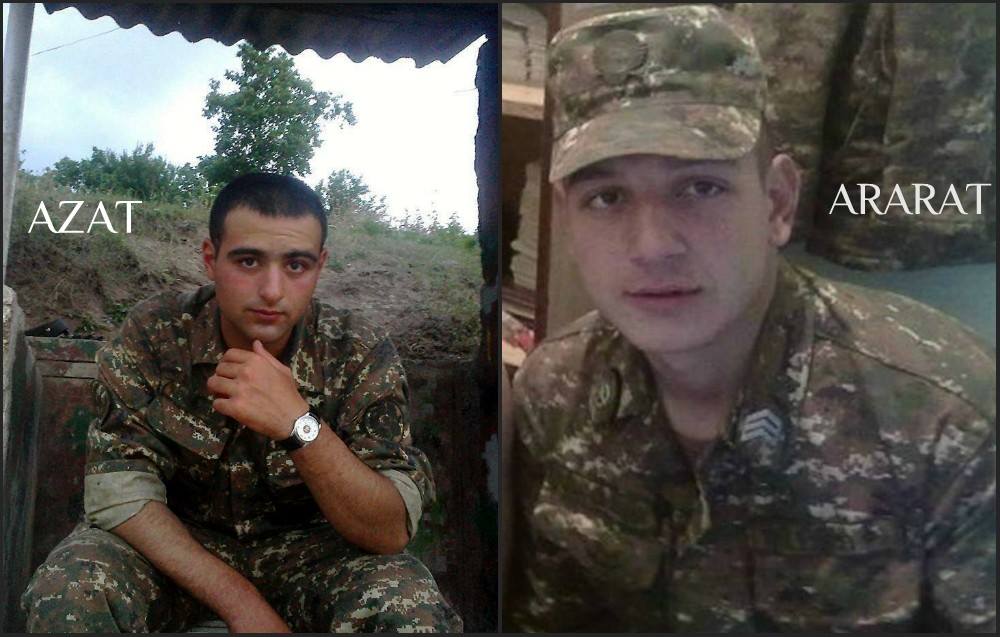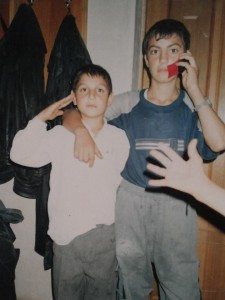By Elizabeth Chouldjian
As Azerbaijan once again escalates its aggression against Armenia and Artsakh, we are reminded of the bravery of Major Sergey Sahakyan and the two soldiers who perished in yesterday’s helicopter attack, as well as, all the soldiers who stand guard on the front lines defending the Homeland. In August, ANCA Communications Director Elizabeth Chouldjian had the honor to meet with the family of one such soldier, Ararat Khanoyan, who along with Azat Asoyan died on the Artsakh front lines on July 31. This is their story.
***
He is named Ararat, after the mountain that stands guard over the Armenian nation and for the grandfather who made the village proud as a Member of Parliament a generation ago—but his family and friends throughout the village of Sardarabad affectionately call him “Aber”— brother.
From the tender age of 10, he is pictured with his cousin in full salute to the flag and country he holds dear.
Like his father, he has a knack for fixing things—helping his dad repair cars starting in the 5th grade; bringing home worn out school desks and chairs, sanding them down, painting them and taking them back to the classroom.
At 18, when he is informed that it is time to leave for his compulsory 2-year military service, he comes home, kisses his mother and invites family and friends over for a celebration. He would soon be off defending the Homeland.
As he and his friends board the transport to the base, he asks his mother not to cry. His friends’ parents are in tears, his father and sister have looked away, hiding emotion, and he once again, tells his mother, “Mom, I’ll be watching from the window. Please, don’t cry. I’m off to serve my Homeland. I’ll be coming home soon.”
His superiors in the army realize he is a fast-study and gifted leader—respectful of authority but unafraid to speak frankly when asked.
After a particularly long shift at the front, he goes down to the river for a much needed bath, where he is met by none other than a General visiting the area. The General beckons and asks gruffly, “Soldier, is this how one behaves at the front lines?” Ararat, woefully out of uniform, but in full salute responds “General, would you ask that of your son if you knew he had just pulled a double shift at the front?” The General is surprised at the quick wit of the soldier and asks, “Do you have a complaint you would like to register?” Ararat responds, “Not one sir. Just doing what any other soldier would do.”
He rises to the level of sergeant in less than a year—and is rewarded with additional responsibilities. He is asked to help train ten new recruits—soldiers who have yet to learn the right way to tie their boots—because his superiors know he will prepare them well. His commanding officer, sent on ten days furlough—leaves the command to young Ararat. They trust the 19-year-old and start encouraging him to consider a career in the military. He is unsure—torn between following his father’s footsteps in the village and life in the Armenian armed forces.
On July 31, 2014, that is no longer a decision he would have to grapple with.
In the northern parts of independent Artsakh, on the front line with Azerbaijan, Ararat and his team are out getting provisions for those defending their posts. As he and fellow soldier, Azat, walk the path, they come upon Nerses, injured and unresponsive. They quickly arrive to assist—where they are met by an enemy attack.
This is not a faceless sniper shooting from hundreds of meters away. This is not artillery from the other side of the Azerbaijani side of the line of contact. These are Azerbaijani soldiers on Artsakh soil.
Ararat and Azat’s rifles are inaccessible. Ararat, as the senior officer, must make decisions and act fast.
They could surrender and be taken prisoner—likely kept alive for a soldier swap—though the Azerbaijani military has this nasty habit of torturing and/or killing even defenseless villagers who wander into their territory. Would their fate as captured soldiers from the front line be any better?
And, who is to say this is a kidnap effort at all? If the Azerbaijani soldiers get through, they could gun down their whole team and leave the border exposed to a larger attack.
Ararat and Azat fight off the Azerbaijani threat—hand-to-hand combat—using whatever method they can to stop/push off an armed enemy.
Azat is injured.
Ararat gets hit with a rifle butt squarely on his cheek. As he is going down, he sees an Armenian soldier coming down the path, unaware yet of what is going on. He calls out to shoot in the air and sound the alarm—to call the troops to defend the line.
The Azerbaijani soldiers—realizing imminent defeat—stab Ararat through his side, puncturing his lungs, and flee for dear life.
The Armenian soldiers fortify the position and take the injured soldiers—Ararat, Azat and Nerses—to the hospital. Only Nerses would survive.
Ararat’s mother is notified of her son’s brave fight against an Azerbaijani attack—and of his passing. She is in shock. Just that morning her precious son had called her and told her of a dream he had. Ararat was in a field of white snow—just melting with the arrival of spring. Flowers were starting to bloom as the cold was melting away. “What does it mean, Mom?” he had asked.
High ranking officials from the Armenian Defense Ministry would come to offer a posthumous medal that the family places proudly in his room along with photos of his time in the service and images of his childhood antics—a shrine to their beloved son and brother which they plan to maintain for generations.
His mother is inconsolable. Words cannot assuage the grief.
They ask what they can do to assist. “Guarantee to me that you bring back the rest of the soldiers safe, so that no other mother and family goes through what we are going through right now,” his mother answers.
“And shall we leave the front unattended and give back the land that your Ararat fought and died to defend?” one of the military leaders asks.
“No, sir,” she answers. “I’ll pick up his rifle and stand at the front myself before I let that happen.”
The post A Hero’s Tale appeared first on Armenian Weekly.

